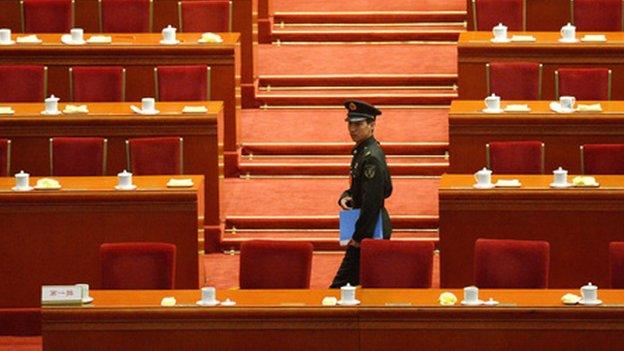Power politics exposed by fall of China's security boss
- Published
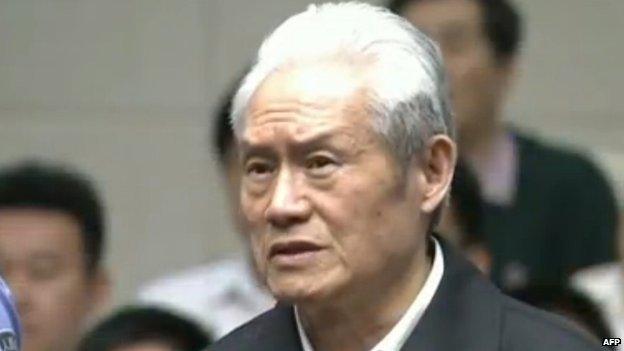
Zhou Yongkang found himself in court because of a power play which went wrong
A white haired shadow of his former self, China's once all-powerful security boss Zhou Yongkang made his first public appearance in nearly three years from the dock of a criminal court.
"I accept the sentence. I will not appeal. I realise the crime I've committed and what I've cost the party," he said.
He was convicted of accepting bribes of 130m yuan ($21.3m; £13.8m), abusing his power and leaking state secrets. The state news agency said the trial was held in closed session due to the secrets charges.
A commentary from the Communist Party's flagship newspaper, The People's Daily, was read on state television's main evening news broadcast: "No one is above law. This case shows that our country is practising the rule of law and our party is determined to eradicate corruption."
The official account of the closed trial said Zhou Yongkang himself conceded the court process was fair and reasonable.
It included videotape testimony from his wife and son, and the court heard that most of the bribes involved family members.
Although the trial was only reported after the event, the official account was robust in its defence of China's judicial process. It said defence lawyers had many opportunities to talk to their client and were also able to cross-examine witnesses.
Few members of the public are weeping for Mr Zhou tonight.
"Tiger Zhou didn't escape lawful punishment. It should ring a warning bell for others", "Support justice. Everyone should obey laws!", "He knows law but breaks law. He deserves to be punished. We're determined to battle corruption," were some of the comments on the website Weibo.
Palace intrigue
Zhou is just the latest victim of the Orwellian security system he once ran.
Although the key charges relate to corruption, his trial is about politics much more than it is about money.
Zhou is in court because of a power play which went wrong.
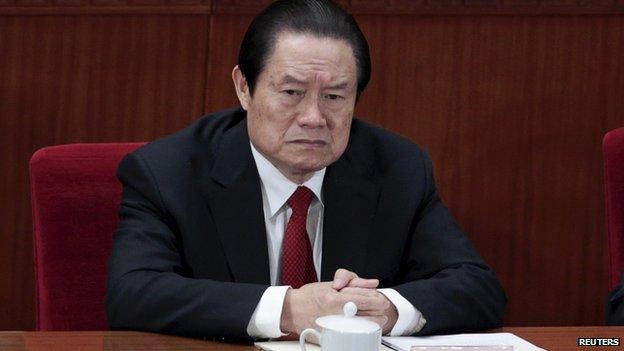
Zhou once controlled the police, paramilitary, intelligence services, prisons and courts
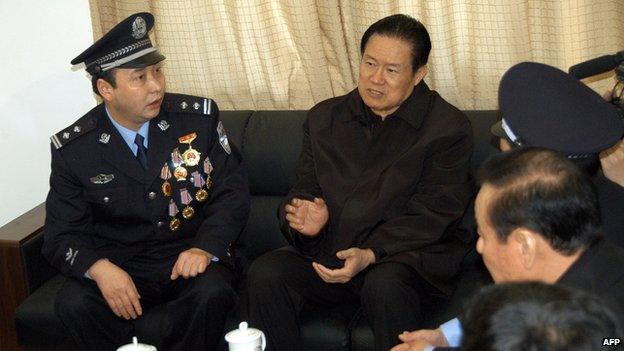
Zhou, pictured here with police officers in 2006, was one of the most powerful men in China
During three and a half decades of high-speed growth, bribery and abuse of power have become commonplace among China's Communist Party elite and the charges Mr Zhou faces could be hung round the neck of many of those who currently wield power.
As for deliberately revealing state secrets, almost every aspect of the life and work of China's leadership is deemed a state secret and so this charge too can cover a multitude of sins.
In 2015, Chinese politics is still living through the fall-out of the vicious succession battle which brought Xi Jinping and a new top team to power - a battle in which a murder dealt the winning side a sensational wild card.
But is unlikely that Zhou Yongkang's trial revisited the poisoning of a British businessman in a Chongqing hotel room; and politics watchers will be disappointed that holding the trial entirely in secret has denied them any new insights into the 2012 succession struggle.
This way the current leadership can control the narrative around the theme of corruption, and avoid reminding the public of the dangerous and deadly ways the party elite operates.
But Chinese history is full of palace intrigue over which princeling will succeed the emperor - and a diet of TV soap operas keeps the public conversant with the Byzantine plots and murderous vendettas habitual to its political class.
Xi Jinping himself said recently that the "gene of traditional Chinese culture" is deeply planted in China's governance strategy.
It is unlikely he was referring to blackmail, poisoning and police cover ups.
But when it is no longer treason to tackle the subject matter, the year which began with a murder on 14 November 2011 and ended with the coronation of Xi Jinping exactly 12 months later will provide rich material for historians and scriptwriters alike.
Zhou Yongkang is one of the key protagonists of this drama, and mistakes made then are key to his disgrace now.
His key crimes are political, and the offences for which he has now been sentenced to life imprisonment merely provide the weapon for exacting revenge and ending his career.
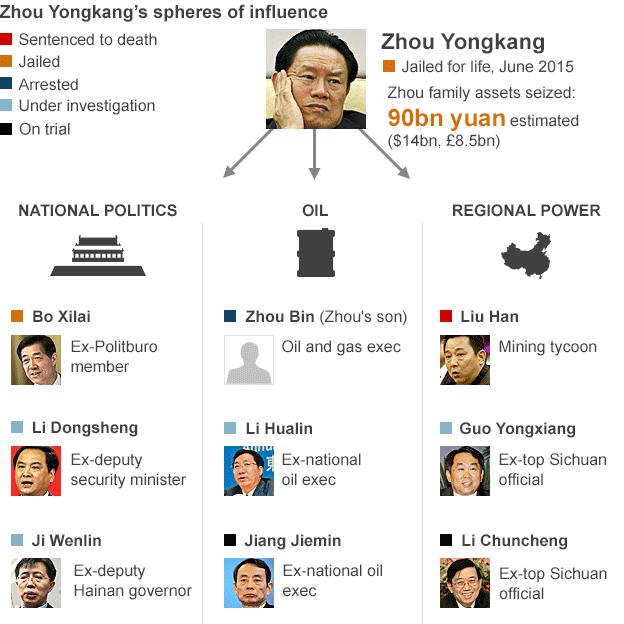
So what really happened to bring Zhou Yongkang to the dock?
The short answer is that he was unlucky. He picked the wrong ally in Bo Xilai.
Mr Bo is now also serving a life sentence, but until his wife murdered a British businessman and he fell out with his police chief over the cover up, the Chongqing Party Secretary was aiming for China's top decision making body, the Standing Committee of the Politburo.
It is important to remember that the political battle in the run up to the 18th Communist Party Congress of November 2012 was less about Xi Jinping's accession to the role as party leader for the next decade and more about which men would share the top table with him.
Mr Zhou was required by party rules to retire from the Standing Committee, and it seems plausible that he had decided on Bo as his successor.
Like most party elders, Mr Zhou probably intended to continue his politics from retirement, with his protege Bo protecting his business interests and those of his family and patronage network.
There is no way of confirming rumours that the two plotted to remove Xi Jinping from office, but after the decade of elite bloodletting which accompanied the Cultural Revolution, and the disagreements which threatened to split the leadership two decades later over how to handle the 1989 democracy protests, Beijing is acutely sensitive to the danger of fractures at the top.
In March this year, the Supreme People's Court highlighted questions over what Zhou and Bo were planning when it said in its annual report that Zhou Yongkang and Bo Xilai had "trampled the law, damaged unity within the Party and conducted non-organisational political activities".

Timeline: Zhou Yongkang
1942: Born in Wu Xi city in China's eastern Jiangsu Province
1964: Joins the Communist Party and spends the next 32 years in China's oil sector
1998: Becomes party secretary of China National Petroleum Corporation
1999: Appointed party secretary of Sichuan
2002: Appointed member of the Politburo at the 16th Party Congress; becomes minister of public security later that year
2007: Further promoted to member of the Standing Committee of the Politburo - China's highest state organ
2012: His lieutenants begin to get sacked and investigated; he appears with Bo Xilai at Chinese National People's Congress session
December 2013: His son Zhou Bin is arrested on corruption charges
December 2014: Arrested, expelled from party
June 2015: Sentenced to life in prison

But even in the densely plotted world of Chinese politics, the best laid plans can go awry.
Neither Zhou Yongkang nor anyone else could have predicted that in November 2011, Bo's wife Gu Kailai would murder a long time British business associate, Neil Heywood, over a business quarrel.
Murder in itself was not enough to rock a high-flying Chinese political career.
Everyone involved seemed to feel invulnerable at the time.
The Chongqing police chief, Wang Lijun, had actually helped Gu obtain the poison she used, and subsequently it was he who organised the cover up.
But events soon started to spiral out of control when the conspirators fell out.
Wang tried to use his knowledge of the murder as political leverage, Bo sacked him and the police chief then pulled the sensational stunt of fleeing to the American consulate in nearby Chengdu to beg for asylum.
Suddenly this was no longer an everyday tale of murder and intrigue in Chinese politics but an international incident which had exploded into the cauldron of Beijing's succession struggle just as the party leader in waiting, Xi Jinping, was about to visit the US.
The charismatic Bo Xilai had earned enemies among the leadership in Beijing through his Maoist slogans and populist campaigns.
As the spreading scandal of murder and cover-up threatened to engulf Bo's hopes of promotion, Zhou fought hard to protect him.
In March 2012, just as the rest of the Standing Committee were uniting against Bo Xilai, Zhou spoke up to defend him.
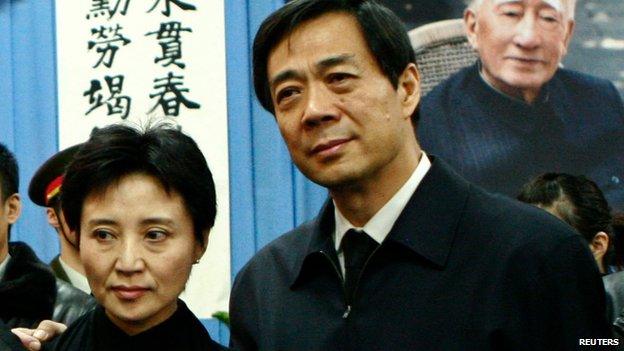
Zhou Yongkang ally Bo Xilai (right) was tipped for the top of the Communist Party leadership...
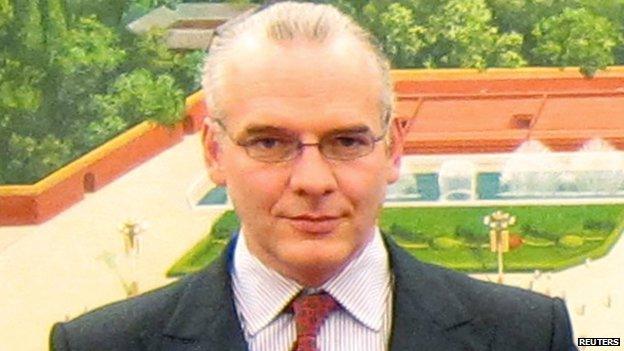
... but he suffered a dramatic fall from grace after his wife Gu Kailai was found guilty of murdering British businessman Neil Heywood
For the man who once controlled police, paramilitary, intelligence services, prisons and courts, the three-year march to the dock of the Tianjin Intermediate Court must have provided an enlightening vantage point from which to view the empire he built.
Zhou Yongkang's last public appearance was on 1 October 2013, a week after his protege was sentenced to life in prison for bribery, embezzlement and covering up a murder.
With Bo's case concluded, the Party's Central Commission for Discipline Inspection could turn their attention to Zhou.
This is a story full of rich ironies.
Three years ago, Zhou praised the court officials who delivered Gu Kailai's murder conviction for serving the Communist Party well and "holding a fair trial which would stand the test of history".
Today, his life spared but his family in the hands of his enemies, the once mighty boss of China's court system pronounced a similarly positive verdict on his own trial.
- Published12 October 2015
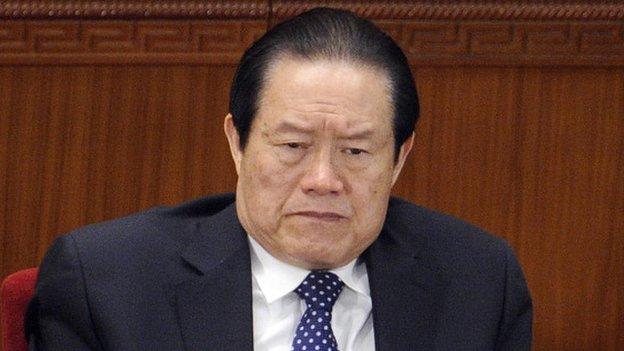
- Published3 April 2015
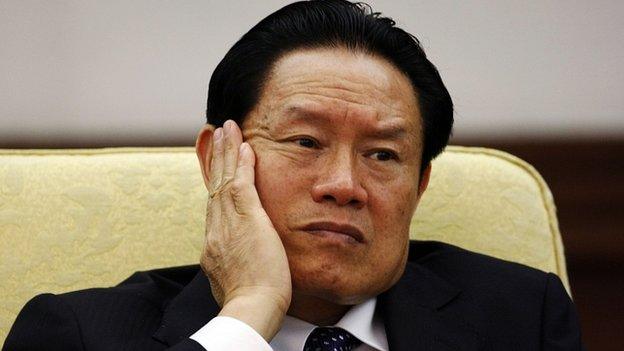
- Published11 June 2015
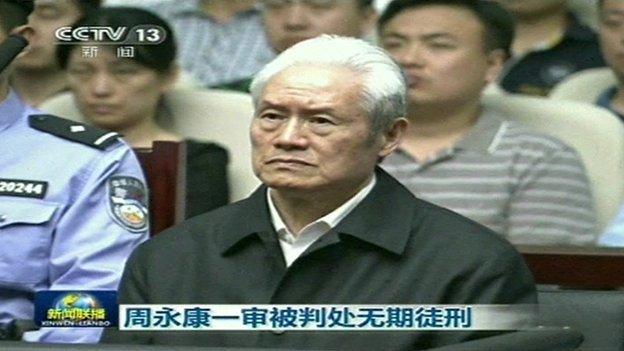
- Published6 May 2014
